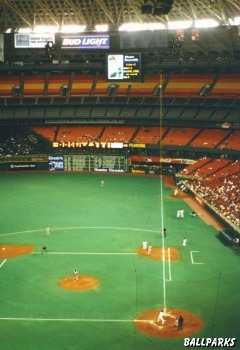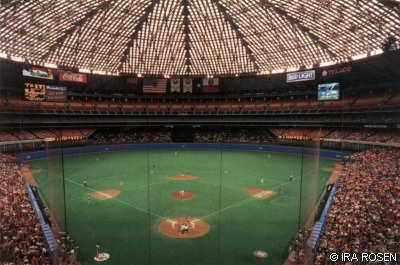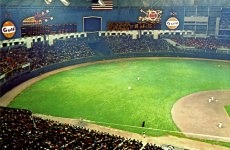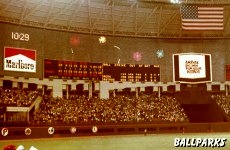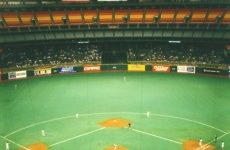Houston, Texas Tenants: Houston Astros (NL; 1965-1999); Houston Oilers (NFL; 1965-96) Architects: Hermon Lloyd & W.B. Morgan and Wilson, Morris, Crain & Anderson Houston Astros tickets:
Location: 8400 Kirby Drive. Center field (E), Fannin Street; third base (N), Old Spanish Trail; home plate (W), Kirby Drive; first base (S), South Loop Freeway/Interstate 610. Dimensions: Foul lines: 340 (1965), 330 (1972), 340 (1977), 330 (1985), 325 (1992), 330 (1993), 325 (1994); power alleys: 375 (1965), 390 (1966), 378 (1972), 390 (1977), 378 (1985), 375 (1992), 380 (1993), 375 (1994); center field: 406 (1965), 400 (1972), 406 (1977), 400 (1985); apex of dome: 208; backstop: 60.5 (1965), 67 (1990), 52 (1993). Fences: Left and right field: 16 (9 concrete below 3 wire, 2 concrete, and 2 wire plus railing, 1965), 12 (concrete, 1969), 10 (concrete, 1977), 10 (canvas, 1990), 19.5 (concrete, 1991), 10 (canvas, 1992); between foul poles and scoreboards: 8 (canvas, 1994); scoreboards: 16 (canvas, 1994); center field 12 (concrete, 1965), 10 (concrete, 1977), 10 (padded, 1990).
Billed as the Eighth Wonder of the World by Astros’ original owner, Judge Roy Hofheinz, the Astrodome was the first ballpark to have a roof over the playing field. It also boasted cushioned orange and red seats, 53 futuristic "Sky Boxes," and a $2-million scoreboard featuring home run extravaganzas, cartoons, and helpful instructions to fans. At first, the Astrodome had real grass. The first Astros game, an exhibition with the New York Yankees, demonstrated that the semitransparent cream-colored panels in the roof made fly balls too difficult to see. So, the ceiling tiles were painted, but the grass died. This led to the installation of plastic grass known as Astroturf. It was ready for Opening Day, 1966. An 18-story building would fit inside its 710-foot diameter, its 9½ acres of real estate, and its steel-beamed ceiling that rises 208 feet above the baseball diamond. The playing field is 25 feet below street level. To light up the field requires more electricity than is used by a city of 9,000 people, and the central air-conditioning has to circulate 2.5 million cubic feet of air a minute. The Astrodome was also the first stadium in the country to use separate Astroturfs for baseball and football, each housed in a storage pit in center field and rolled out on a cushion of air.
In the fall of 1989, a $60 million expansion project enlarged seating capacity in the Astrodome by extending the upper decks into the outfield and adding 66 new Sky Boxes on the Club Level. Two external pedestrian ramps were added to the structure. The floor, which had been dirt since the stadium first opened in 1965 was concreted and the Astroturf was replaced with a new Monsanto "Magic Carpet' system. The Astrodome scoreboard and home run spectacular were replaced by two Diamond Vision screens, a large matrix board, two auxiliary matrix boards and a game-in-progress board. Two manually operated, out-of-town scoreboards giving inning by inning scores of games in progress, were incorporated into the outfield wall in 1993. The Oilers left for Tennessee in 1997, and the Astros moved into the retractable-roof Minute Maid Park to begin the 2000 baseball season. For a few years, the Astrodome still hosted the Houston Livestock Show and Rodeo, high school football playoff games and an other events. However, since the retractable-roof Reliant Stadium was built next door in 2002, the Astrodome has been relegated to hosting an occasional convention. It stands, almost completely unused, waiting for one of the many redevelopment proposals to gain traction. Meanwhile, maintenance of the vacant facility is estimated to cost over $1 million per year. In 2007, a proposal to convert the stadium into a luxury hotel made headlines in the local newspaper.
Trivia:
Recommended Reading (bibliography):
Astrodome Help us provide a better web site by completing our feedback form PHOTOGRAPHS: View down the 1st base line © 1997 by Paul Munsey. Updated June 2007 Sponsorship and other considerations provided by Max Lang Belts and Buckles.
BALLPARKS © 1996-2014 by Munsey & Suppes.
|

